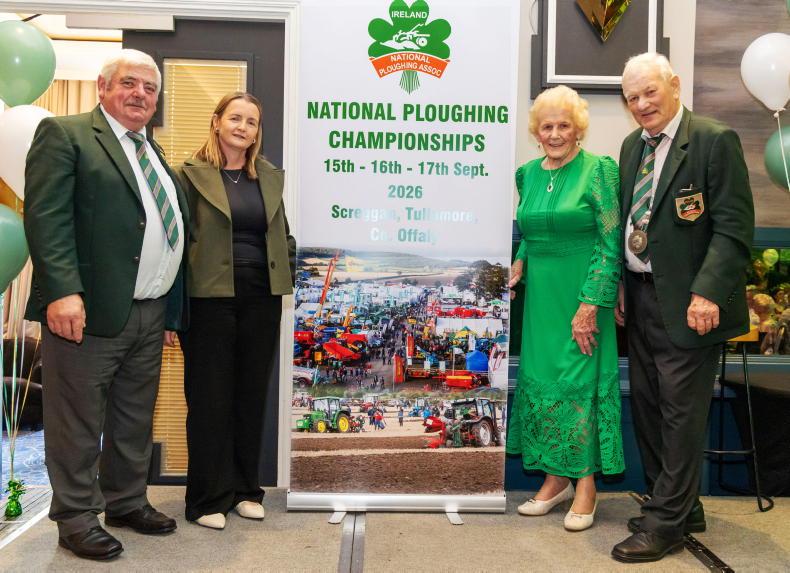After a break of three years, the National Ploughing Championships returns next week. Never was a national event that celebrates the role agriculture plays in underpinning the rural economy more needed.
It has been a difficult three years. Initially, in the face of the COVID pandemic, the essential role farmers play in ensuring consumers had a constant supply of top-quality, nutritious and safe food came centre stage. Like doctors, nurses and the emergency services, farmers and the wider processing sector were recognised as essential services.
The sector stood tall by working together – farmers, hauliers, processors, Department of Agriculture officials and many others all worked with a common purpose: to keep supply chains moving while protecting the health of individuals. The outcome was to keep food on the shelves in Ireland and across Europe.
Demonised
Unfortunately, these efforts were quickly forgotten. A sector that was lauded for keeping food on the shelves was quickly demonised for its contribution to climate change. Far from an essential service, the debate on climate change saw farmers placed at the heart of the problem.

Anna Marie McHugh speaking at the National Ploughing Championships launch event on the site in Ratheniska, Co Laois.
It is a narrative that has undoubtedly taken its toll on farmers and indeed the wider sector – a sector that just a few years ago saw Government policy aligned to driving growth now having to deal with a barrage of policy measures all focused on either curtailing or reducing output and farm productivity.
At a very basic level, the Ploughing offers an opportunity to forget the challenges and for the farming community to engage in what is always a fantastic social event. But at another level it provides the opportunity for the sector to use the focus of the national media to showcase both its importance to the rural economy and the commitment of farmers to reducing the environmental footprint of food production.
Working together
It is important that the sector does not miss this opportunity. During the COVID pandemic, we saw what can be delivered by working together. Rather than competing for air time with an array of different messages, this year’s Ploughing Championships should be used as an opportunity for the sector to speak with one voice.
But the message must be clear and understandable. Discussing on national media the merits of new slurry spreading techniques and the increased use of protect urea means little to an urban audience.
The agenda should be to focus the debate on the important role Irish farmers can play in helping reduce the environmental footprint of global food production while feeding a rising population. Central to this debate is discussing how we can reduce carbon emissions associated with food production rather than agriculture, while emphasising the commitment of farmers to work with consumers in delivering this. To achieve this would be to bring consumers directly into the conversation rather than simply allowing farmers shoulder all of the responsibility for the carbon emissions associated with the production of food which others consume.
Failed energy policy
At present, every consumer is struggling with the impact that the EU’s failed energy policy is having on electricity and fuel prices. And yet many of the same mistakes are being repeated when it comes to food production. In both cases we see a narrow policy agenda focused solely on achieving territorial emissions reduction targets while ignoring the impact on food and energy security. The farm lobby should be united in highlighting how this policy approach to energy production has failed consumers and the environment. If repeated for food production, the consequences will be even more devastating. Would it be a step to far to have a co-signed letter by the presidents of all farm groups?
The Ploughing will also provide the opportunity to put the rural agenda front and centre with politicians just days ahead of the Government finalising Budget 2023.
Farmers valued
Speaking at the ASA conference last week, Simon Coveney told delegates that budget measures will show farmers that they are a valued part of the solution to climate change. The support mechanisms provided to farmers in Budget 2023 will prove the extent of the Government’s real ambition to reduce emissions from food production in Ireland – beyond just setting targets.
Finally, we look forward to welcoming all of our readers and commercial clients to our stand over the course of the three days and wish National Ploughing Association managing director Anna May McHugh and all her team every success and best wishes for the event.
After a break of three years, the National Ploughing Championships returns next week. Never was a national event that celebrates the role agriculture plays in underpinning the rural economy more needed.
It has been a difficult three years. Initially, in the face of the COVID pandemic, the essential role farmers play in ensuring consumers had a constant supply of top-quality, nutritious and safe food came centre stage. Like doctors, nurses and the emergency services, farmers and the wider processing sector were recognised as essential services.
The sector stood tall by working together – farmers, hauliers, processors, Department of Agriculture officials and many others all worked with a common purpose: to keep supply chains moving while protecting the health of individuals. The outcome was to keep food on the shelves in Ireland and across Europe.
Demonised
Unfortunately, these efforts were quickly forgotten. A sector that was lauded for keeping food on the shelves was quickly demonised for its contribution to climate change. Far from an essential service, the debate on climate change saw farmers placed at the heart of the problem.

Anna Marie McHugh speaking at the National Ploughing Championships launch event on the site in Ratheniska, Co Laois.
It is a narrative that has undoubtedly taken its toll on farmers and indeed the wider sector – a sector that just a few years ago saw Government policy aligned to driving growth now having to deal with a barrage of policy measures all focused on either curtailing or reducing output and farm productivity.
At a very basic level, the Ploughing offers an opportunity to forget the challenges and for the farming community to engage in what is always a fantastic social event. But at another level it provides the opportunity for the sector to use the focus of the national media to showcase both its importance to the rural economy and the commitment of farmers to reducing the environmental footprint of food production.
Working together
It is important that the sector does not miss this opportunity. During the COVID pandemic, we saw what can be delivered by working together. Rather than competing for air time with an array of different messages, this year’s Ploughing Championships should be used as an opportunity for the sector to speak with one voice.
But the message must be clear and understandable. Discussing on national media the merits of new slurry spreading techniques and the increased use of protect urea means little to an urban audience.
The agenda should be to focus the debate on the important role Irish farmers can play in helping reduce the environmental footprint of global food production while feeding a rising population. Central to this debate is discussing how we can reduce carbon emissions associated with food production rather than agriculture, while emphasising the commitment of farmers to work with consumers in delivering this. To achieve this would be to bring consumers directly into the conversation rather than simply allowing farmers shoulder all of the responsibility for the carbon emissions associated with the production of food which others consume.
Failed energy policy
At present, every consumer is struggling with the impact that the EU’s failed energy policy is having on electricity and fuel prices. And yet many of the same mistakes are being repeated when it comes to food production. In both cases we see a narrow policy agenda focused solely on achieving territorial emissions reduction targets while ignoring the impact on food and energy security. The farm lobby should be united in highlighting how this policy approach to energy production has failed consumers and the environment. If repeated for food production, the consequences will be even more devastating. Would it be a step to far to have a co-signed letter by the presidents of all farm groups?
The Ploughing will also provide the opportunity to put the rural agenda front and centre with politicians just days ahead of the Government finalising Budget 2023.
Farmers valued
Speaking at the ASA conference last week, Simon Coveney told delegates that budget measures will show farmers that they are a valued part of the solution to climate change. The support mechanisms provided to farmers in Budget 2023 will prove the extent of the Government’s real ambition to reduce emissions from food production in Ireland – beyond just setting targets.
Finally, we look forward to welcoming all of our readers and commercial clients to our stand over the course of the three days and wish National Ploughing Association managing director Anna May McHugh and all her team every success and best wishes for the event.









SHARING OPTIONS